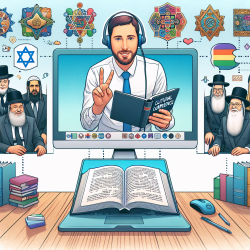Intercultural therapy (ICT) is a dynamic and essential field, especially in diverse societies like Israel. The research article "Intercultural therapy with Ultra-Orthodox Jews in Israel: the complexity of the encounter between secular therapists and Haredi clients" provides critical insights into the unique challenges and opportunities in this domain. This blog will explore how practitioners can enhance their skills by implementing the outcomes of this research.The Ultra-Orthodox (Haredi) community in Israel presents a distinct set of cultural and religious values that often clash with the secular worldview of many therapists. Understanding these differences is crucial for effective therapy. The research highlights two key aspects: the distinctive attributes and conflicts inherent in treating Ultra-Orthodox individuals and the nuanced power dynamics within the therapeutic relationship.To improve your skills as a practitioner, consider the following strategies based on the research findings:
1. Develop Cultural Sensitivity
Understanding the cultural and religious background of your clients is paramount. The Haredi community values collectivism, religious adherence, and a distinct separation from secular society. Familiarize yourself with their customs, language (Yiddish), and religious practices to build trust and rapport.
2. Navigate Power Dynamics
The therapeutic relationship with Haredi clients involves a unique power balance. While they may rely on secular therapists for professional help, there is often a deep-seated mistrust. Acknowledge this dynamic and strive to create a safe, non-judgmental space for your clients.
3. Address Socio-Political Context
The socio-political climate in Israel often positions the secular and Ultra-Orthodox communities as conflicting entities. Recognize how these broader societal tensions may impact the therapeutic relationship and address them sensitively within sessions.
4. Enhance Communication Skills
Effective communication is key in ICT. Use culturally congruent language and avoid imposing your values. Instead, encourage open dialogue and actively listen to your clients' perspectives. This approach fosters mutual respect and understanding.
5. Continuous Learning and Adaptation
Intercultural therapy is an evolving field. Stay updated with the latest research and best practices. Engage in continuous professional development and seek supervision or peer support when working with culturally diverse clients.
6. Collaborate with Community Leaders
Building relationships with Haredi community leaders, such as rabbis, can enhance your credibility and effectiveness as a therapist. Their support can facilitate your clients' acceptance of therapy and adherence to treatment plans.
7. Reflect on Personal Biases
Self-awareness is crucial in ICT. Reflect on your biases and how they may affect your therapeutic approach. Cultivating cultural humility allows you to engage more authentically with your clients.
8. Encourage Client Empowerment
Empower your clients by involving them in the therapeutic process. Encourage them to express their needs and preferences, and collaborate on setting treatment goals. This approach enhances their sense of agency and engagement in therapy.By integrating these strategies into your practice, you can improve your skills in intercultural therapy and provide more effective support to your Ultra-Orthodox clients. To read the original research paper, please follow this link:
Intercultural therapy with Ultra-Orthodox Jews in Israel: the complexity of the encounter between secular therapists and Haredi clients.
